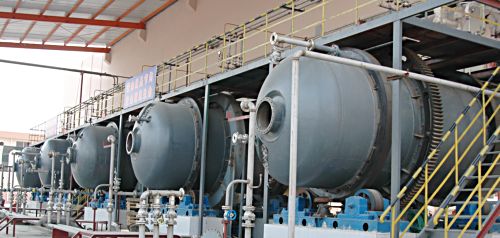 10,000-tonne insoluble sulphur plant. Photo courtesy of China Sunsine.
10,000-tonne insoluble sulphur plant. Photo courtesy of China Sunsine.
CHINA SUNSINE Chemical, which produces rubber accelerators used in tire making, is firmly parked in the domestic market - and has seen a strengthening of orders from China-based clients in the first five months of the year.
The Shandong Province-based firm’s heavy reliance on sales in China has helped it avoid the ‘flat tires’ faced by many domestic manufacturers who have been overly dependent on exports and now face precipitous declines in overseas orders arising from a global economic slowdown.
A quick look at China’s market goes a long way toward explaining why Sunsine’s sales revolve around domestic tire makers.
In 2007, China overtook Japan to become the world’s No.2 vehicle market, now second only to the US.And some industry experts expect the Middle Kingdom to be King of the Road sooner rather than later, possibly as early as this year.
Singapore-listed Sunsine, the world’s No.1 rubber accelerator maker, was a standout performer last year and in the first quarter.
The company improved both its top and bottom line numbers last year on a strengthening domestic market position and continued strong client relationships overseas.
Revenue last year rose to 798 mln yuan from 620 mln a year earlier, while the bottom line improved to 107 mln yuan from 76 mln.This gave Sunsine a 2008 gross margin of 28.4%, much improved from the 20.2% a year earlier.
However, the global credit crunch and slumping demand worldwide finally let some air out of Sunsine’s tires, with first quarter revenue falling nearly 20% year-on-year to 134.1 mln yuan.
First quarter export sales declined by 42.1% to 44.7 mln yuan as the export markets were more affected by the global crisis than China in the current quarter, the company said.
Key customers include Bridgestone, Pirelli, Continental, Sumitomo Rubber, Goodyear, PMC India, and Korean Kumho. Maiden contributions came from Continental US, Hankook Europe, and other plants of a key customer.
Meanwhile, sales within China remained more or less flat, slipping by just 0.7% to 89.4 mln yuan in the first three months, with key customers remaining Hangzhou Zhongce, GITI Tyres, Double Coin Tyres (formerly Shanghai Tyres), Sumitomo Rubber (China) and Korean Kumho (China).
But the company is taking steps to bounce back from the three-month slowdown.
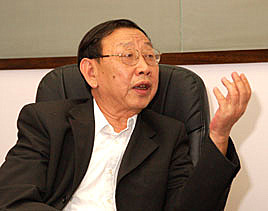
Photo by Sim Kih
Domestic sales up
In an exclusive interview with NextInsight, Sunsine Executive Chairman Xu Chengqiu said that the company was even seeing a firming up of domestic sales on skidding orders from global tire giants, with Sunsine’s exports as a contributor to sales revenue falling to just 32% in the first five months of this year from 45% last year.
“First quarter volume was down a lot so we were affected by the global economic crisis. But we implemented measures to deal with the slower demand,” Mr. Xu said.
The company’s “quick responses” and “adjustable pricing power” helped it prevent an even slower quarter.
“We raised capacity in 2008 in order to better reach out to different customers. Clients are gaining more and more trust in us and our brand name,” he said.
Mr. Xu said that the global vehicle production industry was going through a slowdown, even in China where annual auto sales growth has been nothing short of torrid these past few years.
“The auto sector is slowing, and this affects us as tires are our end customer. So we are reaching out to different sectors. Our synergies are working increasingly well and we are going all out to reach out to our customers.”
Nearly seven out of every 10 yuan the company made in the first five months came from Chinese orders, and Sunsine was confident its home market would continue to be its main sales driver for the foreseeable future.
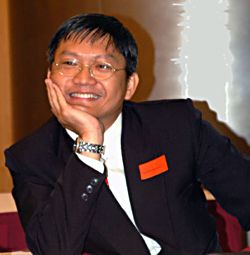
“The domestic market will keep growing fast, it is still a very strong market,” he said.
Mr. Xu credited Beijing’s ongoing 4.5 trln yuan economic stimulus package as contributing to the company’s fortunes since money began flowing into various “key industries,” one of which was the auto sector.
“The stimulus package lifts all boats, and is definitely giving us a boost, especially as it promotes the construction of transportation infrastructure including roads and bridges. This requires more tires in use. The package helped our first quarter, and will result in higher business volume in China.”
He said that while Sunsine sold to tire makers, and not directly to automakers, he could not accurately assess how the troubled No.1 US carmaker’s bankruptcy protection status would affect accelerator sales in China, where General Motors (GM) has a significant and growing presence.
“GM tire orders are likely down, but we still have overall continuity in order stability. The China market is still very strong.”
He said the Big Three in the US – as well as EU automakers -- have suffered of late due to slowing consumer demand, overcapacity and cost issues.
“But we have strong product quality and enjoy an economy of scale. We are enhancing our ability to support global customers and increased output volume. Although global demand has dropped, China is still a positive market. There is no negative growth anywhere in China. We are very confident on sales volume with growth this year. We have pulled through this crisis.”
Since the company’s listing in Singapore nearly two years ago, China Sunsine has seen faster growth, and 55 mln sgd in new funding, Mr. Xu said.
“The listing has helped us accelerate investment, raise capacity and offer more products,” he said, adding that accelerator capacity rose from 32K tons at listing to some 50K tons today.
“This will rise to around 55,000 tons by the end of this year.”
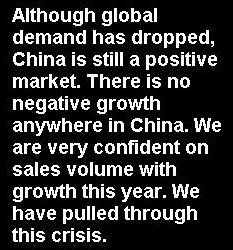
”Top 10 won’t go bankrupt”
Mr. Xu said he was not worried about its major clients – many of whom are top multinational tire makers – following in the tire tracks of carmakers and declaring bankruptcy or bowing to suitors.
"Our major global clients are all very large. For example (Japan’s) Bridgestone has 50 production facilities scattered across the world. We don’t expect the top 10 to go bankrupt.”
On the contrary, he said smaller domestic tire producers and rubber accelerator makers would be more prone to mergers, dissolution or collapse.
“While we supply China’s top 10 tire makers, the smaller ones are constantly going out of business. We see continued consolidation in China’s auto sector. We also believe smaller players with weaker balance sheets and little product range will be bought by bigger peers. Consolidation and acquisitions in our sector in China will help us expand and boost market share.
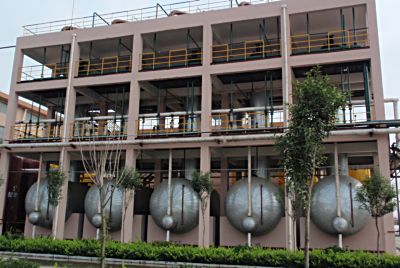
“Additionally, we expect that after the current crisis, the world tire market will continue to grow.”
Although Sunsine has relied on organic growth up to this point, this does not mean it is not courting attractive peer acquisitions where feasible. We have no announcements at this time. But when the time and price are right, you’ll hear from us.”
He said the company’s decision to list in Singapore in July 2007 was more “by chance” than design, but Sunsine had no regrets and had much praise for the bourse there.
"We chose Singapore because we had the opportunity at the time. It was by chance. Our Shandong local government here organized a study tour to Singapore to check out the IPO market. And as lawyers, auditors and officials in Singapore encouraged us to list there, and the environment is very transparent there, we worked toward and met SGX-listing criteria.
“It took just 10 months to list. This fact shows that regulations are very mature and transparent.Although we believe our current valuation there is very undervalued, we expect to boost business and competitiveness. So we have no plans to list elsewhere at this point.”
Finally, Mr. Xu said that his firm was taking environmental protection seriously.
“We recognize the importance of environmental regulations. China will get stricter. We engage in waste management, waste gas treatment and recycling so regulations will not pose a big problem for us, but will be a problem for our smaller, less efficient domestic competitors.”
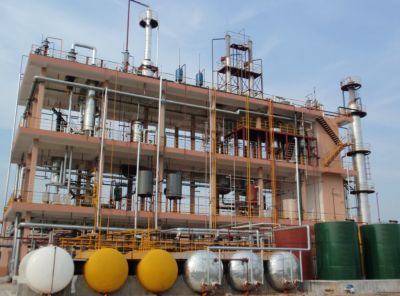
As a chemical producer servicing global customers, China Sunsine continuously improves its manufacturing capability, and has achieved ISO9001:2000 standard for quality, ISO14001:2004 standard for environment, and GB/T28001-2001 standard for occupational health and safety management system, the company said.
Previous story:
CHINA SUNSINE: Picking up pace to be world's No.1






